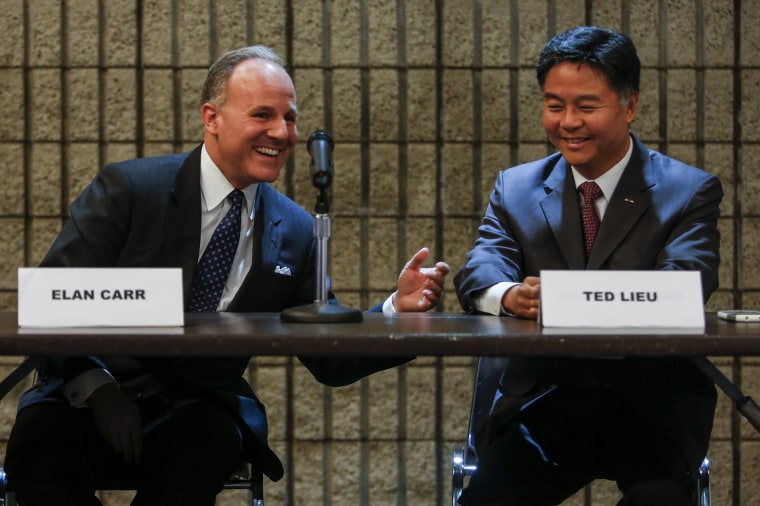Elan Carr, the Trump administration's new special envoy for combating anti-Semitism, said Thursday that organized boycotts of products made in Israeli settlements is anti-Semitic, even if the settlements are not recognized by international law.
Carr's comments came on his first day in the congressionally mandated post left vacant by the administration for the last two years.
“An individual has a right to buy or not buy what they please. However, if there is an organized movement to economically strangle the state of Israel, that is anti-Semitic,” Carr said. “We are going to focus relentlessly on eradicating this false distinction between anti-Zionism and anti-Semitism.”
Past U.S. policy considered Israeli settlements built on land captured in the 1967 war as illegal, in following with international law, but the view of the current administration is unclear.
Secretary of State Mike Pompeo declined several opportunities this past week to say how the U.S. would respond if newly re-elected Israeli Prime Minister Benjamin Netanyahu followed through on his campaign promise to annex Israeli settlements in the West Bank.

The U.S. recognized Israel’s sovereignty over the Golan Heights, land annexed by Israel from Syria in 1981, one month before the Israeli election.
Carr called the boycotting of goods in Jewish settlements anti-Semitic when one would be willing to buy from the Arab communities that live next door.
“If two communities are living side by side and one refuses to buy from Jews and one wants to buy from non-Jews, that's pretty clear what that is,” Carr said.
Carr’s comments came 24 hours after Palestinian activist and co-founder of an Israeli boycott movement called BDS, Omar Barghouti, was prevented from boarding a plane to the U.S. from Tel Aviv.
A growing pro-Palestinian effort, the BDS movement calls for boycotts, divestment and sanctions as a form of non-violent pressure on Israel to secure Palestinian rights. But as the movement grows, so does pushback in the United States, where more than 25 states have passed legislation in an effort to combat it.
“This isn't a, you know, a ragtag group,” Carr said of the BDS movement. “It's organized and the stated goals are clear, and the stated goals on the website of the of the BDS movement is to deny the state of Israel economic prosperity and to not deny it legitimacy, that is anti-Semitism.”
Barghouti was leaving Tel Aviv Wednesday to go to the United States on a U.S. visa he had used to enter many times before, when he was prevented from boarding his plane. He was head to the U.S. for a speaking tour, including a talk in Washington at an Arab American Generations event co-sponsored with Jewish Voice for Peace. He also was scheduled to deliver speeches at NYU and Harvard and participate in a Passover dialogue with Rabbi Brent Rosen at the Tzedek Chicago synagogue. He had also had planned to attend his daughter’s wedding.
“I am hurt, but I am not deterred,” Barghouti said.
Barghouti said he believes the decision to deny him entry to the U.S. was “ideologically and politically motivated.”
State Department officials said they could not discuss details of individual visa cases but pointed out that U.S. law does not allow visas to be denied based solely on political statements or views, “no matter how distasteful or objectionable some may find [them].”
The American Civil Liberties Union does not take positions on boycotts of Israel or any foreign country but defends the right to boycott under the First Amendment.
Hina Shamsi, director of the ACLU's National Security Project, said denying Barghouti appeared to be an “ideological exclusion.”
“Ideological exclusion was used in the past to revoke or deny visas to some of the world’s leading writers, artists, and thinkers,” Shamsi said in a statement. “If the Trump administration is using this political censorship tool again, it’s a disgrace and a violation of Americans' First Amendment rights. The Trump administration should not decide which ideas Americans can and cannot hear directly from speakers."


